
OPEN ECONOMIES REVIEW
Scope & Guideline
Connecting Scholars to Economic Innovations.
Introduction
Aims and Scopes
- International Finance and Monetary Policy:
Research on the implications of international financial flows, exchange rates, and monetary policy in both advanced and emerging economies. - Trade Dynamics and Economic Integration:
Studies exploring the effects of trade agreements, tariffs, and globalization on economic performance and structural changes in various economies. - Economic Growth and Convergence:
Investigations into the factors influencing economic growth, convergence dynamics, and disparities across different regions and countries. - Impact of Global Shocks and Crises:
Analysis of how global economic crises and shocks (such as the COVID-19 pandemic) impact national economies and international relations. - Empirical Methods and Econometric Modeling:
Application of advanced econometric techniques to analyze economic phenomena, including time-series analysis, panel data, and structural modeling. - Policy Analysis and Recommendations:
Evaluation of macroeconomic policies, fiscal measures, and regulatory frameworks in the context of open economies and their effectiveness.
Trending and Emerging
- Digital Economy and Big Data:
An increasing focus on how digital transformation and big data analytics influence trade, investment, and economic policies, particularly in the context of the COVID-19 pandemic. - Sustainability and Environmental Economics:
Emerging research themes that explore the intersection of economic growth, sustainability, and environmental policies, particularly in light of climate change challenges. - Behavioral Economics in Trade and Finance:
A growing interest in incorporating behavioral insights into economic models, especially regarding consumer behavior and financial decision-making in an open economy context. - Regional Economic Integration:
Heightened emphasis on regional trade agreements and their implications for economic convergence and integration, particularly in light of geopolitical tensions. - Inequality and Economic Disparities:
A notable increase in research addressing income inequality and its impacts on economic growth, social stability, and policy responses in both developed and developing countries.
Declining or Waning
- Traditional Trade Theories:
The focus on classical trade theories, which dominated earlier research, has waned as newer models and perspectives that incorporate behavioral economics and digital trade gain prominence. - Static Economic Models:
There appears to be a reduced emphasis on static models that do not account for dynamic changes in global markets, with more researchers favoring dynamic and agent-based models. - Localized Economic Studies:
Research centered solely on localized or country-specific economic issues is becoming less frequent, as the journal shifts towards more comparative and global analyses. - Historical Economic Analysis:
While historical perspectives remain important, there is a noticeable decrease in studies focusing exclusively on historical economic events without clear contemporary relevance. - Single-Country Policy Evaluations:
The examination of policies within a single country context is declining in favor of comparative studies that assess the impact of policies across multiple countries.
Similar Journals
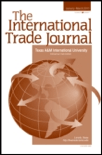
International Trade Journal
Fostering understanding in the world of trade.The International Trade Journal, published by Taylor & Francis Ltd, is a vital resource in the field of international trade, economics, and business management. Established in 1986, this journal offers a platform for rigorous empirical and theoretical research, focusing on the dynamics of global trade and its implications on economic and international policy. With an ISSN of 0885-3908 and an E-ISSN of 1521-0545, it serves as a valuable reference for scholars and practitioners alike. The journal is ranked in the Q3 category for Economics, Econometrics and Finance, signifying its role in disseminating high-quality research. Although it currently does not offer Open Access, the journal's wealth of insights supports researchers and professionals in navigating the complexities of international trade while shaping informed policies. With convergence from 1986 to 2024, the International Trade Journal continues to be an essential tool for fostering knowledge and understanding within this increasingly interconnected global economy.
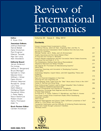
Review of International Economics
Fostering dialogue on critical international economic issues.Review of International Economics, published by WILEY, is a renowned academic journal dedicated to advancing the field of international economics. Since its inception in 1992, this UK-based journal has served as a vital platform for researchers, professionals, and students to share innovative ideas and research findings. With an impressive impact factor and categorized in the Q2 quartile for both Development and Geography, Planning and Development in 2023, it holds a significant place in the academic landscape. The journal is indexed in Scopus, ranking 419th out of 821 in Social Sciences: Geography, Planning and Development, and 165th out of 306 in Social Sciences: Development, reflecting its influential contribution to these fields. Although it does not currently offer open access, the Review of International Economics remains committed to publishing high-quality, peer-reviewed articles that explore pressing global economic issues, thereby enhancing understanding and informing policy across various disciplines.

Journal of Economics Finance and Administrative Science
Unlocking the future of administrative science.Journal of Economics Finance and Administrative Science, published by Emerald Group Publishing Ltd, is a premier open-access journal that has been at the forefront of advancing knowledge since its inception in 2012. With an ISSN of 2077-1886 and E-ISSN of 2218-0648, the journal caters to the disciplines of economics, finance, and administrative sciences within an international context, specifically observing trends from Peru and beyond. This highly regarded journal holds a Q1 ranking in Economics, Econometrics and Finance for 2023, landing it in the top percentile among its peers, with an impressive Scopus rank of #33 out of 288 in general economics. Since transitioning to open access in 2017, the journal has democratized access to cutting-edge research, making it indispensable for researchers, professionals, and students alike. By publishing rigorous empirical studies, comprehensive reviews, and innovative theoretical contributions, the Journal of Economics Finance and Administrative Science aims to facilitate knowledge exchange and foster collaboration within the global academic community.
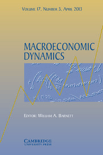
MACROECONOMIC DYNAMICS
Unraveling Macroeconomic Theories and PracticesMACROECONOMIC DYNAMICS, a distinguished academic journal published by Cambridge University Press, serves as a pivotal platform for innovative research in the fields of economics and econometrics. With its ISSN 1365-1005 and E-ISSN 1469-8056, the journal has been at the forefront of scholarly communication since its inception in 1997, offering an extensive range of articles that explore dynamic economic models, policy impacts, and theoretical advancements through the latest empirical analyses. Currently holding a Q2 ranking within the 2023 Economics and Econometrics category, and positioned at rank #409 out of 716 within Scopus, it is an essential resource for researchers, professionals, and students alike, looking to stay updated on critical developments in macroeconomic theory and practice. Although it follows a traditional subscription model rather than Open Access, the journal continually strives to disseminate high-quality, peer-reviewed content that informs and inspires the global economics community. The importance of MACROECONOMIC DYNAMICS lies in its commitment to fostering a deeper understanding of economic phenomena, making it a must-read for anyone engaged in the complexities of the economic landscape.

REVIEW OF WORLD ECONOMICS
Innovating Solutions for Global Economic IssuesREVIEW OF WORLD ECONOMICS, published by Springer, stands at the forefront of economic literature, providing a comprehensive platform for scholarly articles that address contemporary global economic issues. With a distinguished Q1 ranking in the field of Economics, Econometrics, and Finance as of 2023, this journal is recognized among the top tier of academic publications, validating its commitment to high-quality research outputs. The journal's Scopus ranking places it at an impressive 70 out of 288 in the discipline, further exemplifying its relevance and impact within the academic community. Covering a wide array of topics from theoretical frameworks to empirical analyses, the REVIEW OF WORLD ECONOMICS invites contributions that not only enhance the understanding of economic phenomena but also propose actionable solutions. With an inclusive open access model enabling broader dissemination, this journal serves as an essential resource for researchers, professionals, and students alike, enriching the global discourse on economics from its base in Germany.
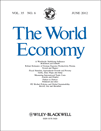
WORLD ECONOMY
Illuminating the path to understanding global finance.WORLD ECONOMY is a premier academic journal published by Wiley, renowned for its rigorous peer-reviewed research in the fields of economics, finance, accounting, and political science. Established in 1977, the journal has consistently contributed to the advancement of knowledge, reflected in its strong standing across various category quartiles, notably achieving Q1 in Accounting and Political Science, and ranking in the top quartile in its respective disciplines as of 2023. With an audience that spans researchers, professionals, and students, WORLD ECONOMY publishes impactful articles that explore critical issues affecting the global economy. Although it is not an open-access publication, readers have access options to engage with cutting-edge research that addresses both theoretical and practical aspects of world economic trends. The journal's commitment to excellence is further underscored by its impressive Scopus rankings, situating it among the top journals in the social sciences arena. For anyone keen on deepening their understanding of the dynamics shaping our economic landscape, WORLD ECONOMY remains an indispensable resource.
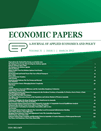
Economic Papers
Shaping Economic Discourse Through Rigorous Scholarship.Economic Papers is a prestigious journal published by WILEY, recognized for its contributions to the fields of economics, econometrics, and finance since its inception in 1982. With an impressive impact factor reflecting its scholarly influence, this journal is ranked in the Q2 category in the Economics, Econometrics, and Finance sector, placing it among the top 30% of journals in the field. The journal aims to disseminate high-quality research that addresses contemporary economic challenges, thereby advancing both theoretical understanding and practical applications. While currently not available as open access, Economic Papers provides vital insights for researchers, professionals, and students striving to deepen their comprehension of economic dynamics and contribute to sound policy-making. Scholars are encouraged to submit their work to engage with a robust academic community and impact the discourse in economic research.
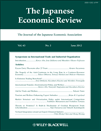
JAPANESE ECONOMIC REVIEW
Advancing insights into Japan's economic landscape.Japanese Economic Review, published by Springer Heidelberg, is a renowned academic journal that aims to advance the understanding of economic processes within the context of Japan and the Asia-Pacific region. With an ISSN of 1352-4739 and E-ISSN of 1468-5876, this journal features high-quality research articles that span a broad range of topics in economics and econometrics. Ranked in the Q2 category for Economics and Econometrics as of 2023, it holds a Scopus rank of #332 out of 716, placing it in the 53rd percentile among its peers. Although not Open Access, the journal invites contributions that provide insights and empirical analyses beneficial to both academics and practitioners. Emphasizing a deep understanding of economic dynamics, the Japanese Economic Review is essential reading for anyone interested in the implications of economic policies and trends, making it a significant platform for scholarly dialogue and research dissemination.
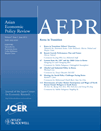
Asian Economic Policy Review
Navigating the evolving economic policies of Asia.Asian Economic Policy Review, published by Wiley, serves as a pivotal platform for advancing understanding and discourse in the fields of economics, econometrics, finance, and political science. Established in 2008 and set to converge through 2024, this esteemed journal boasts a remarkable Q1 category ranking in multiple fields, including Economics, Management, and Political Science, while consistently engaging leading-edge research reflective of the global economic landscape. With an impressive Scopus rank placing it in the top percentiles, particularly in General Economics and Political Science, the journal acts as a vital source for both academics and practitioners. Although it does not operate under an Open Access model, its comprehensive content is widely accessible through institutional subscriptions. Researchers, policymakers, and students alike will find Asian Economic Policy Review invaluable for its inclusive analysis and policy insights pertinent to both regional and international economic frameworks.

World Review of Political Economy
Fostering Innovative Discourse in Political EconomyWorld Review of Political Economy, a distinguished publication by PLUTO JOURNALS, emerges as a vital resource in the interdisciplinary landscape of political economy, sociology, and international relations. Initiated as an open access journal in 2021, it caters to scholars and practitioners by facilitating the immediate and unrestricted dissemination of research findings. With a significant presence in multiple quarters—ranking Q2 in the fields of Economics, Econometrics and Finance, Political Science, and Sociology—the journal reflects its commitment to addressing complex global issues through rigorous analysis and discourse. Nestled in the United Kingdom, it benefits from a rich academic environment, further amplified by its indexing in Scopus, which places it among the influential voices in social sciences. By encouraging innovative approaches and robust discussions, the journal aims not only to inform but also to inspire action among researchers, professionals, and students, thereby contributing meaningfully to the evolving field of political economy.